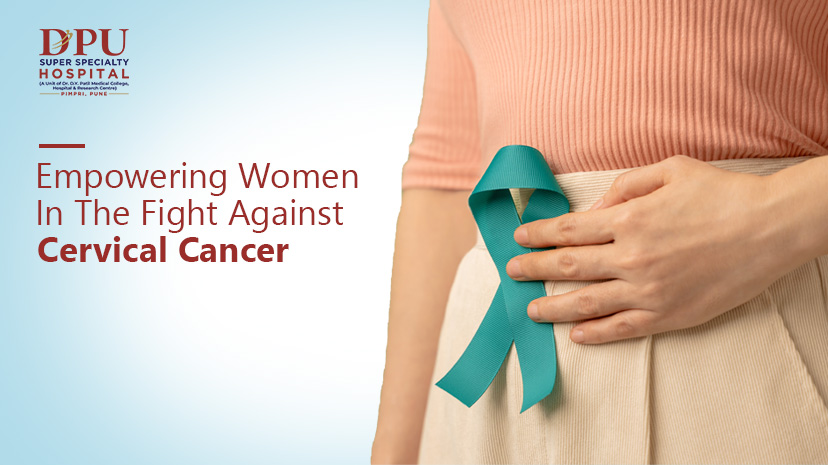Empowering Women In The Fight Against Cervical Cancer

Cervical cancer, being a preventable disease, is a leading cause of mortality among women in many countries. By raising awareness of cervical cancer, let's inform, educate, and empower women to take the steps needed for prevention and early detection.
But let's first understand what cervical cancer is!
The cancer occurs when abnormal cells in the cervix start growing uncontrollably. These abnormal cells develop into tumours and spread to nearby tissues if not detected and treated in time. It's also important to note that there is more than one type of cervical cancer.
The most common type is squamous cell carcinoma, and nearly all of these cases are caused by infection with high-risk HPV (human papillomavirus).
The next most common type of cervical cancer is adenocarcinoma, a cancer of the glands in the inner part of the cervix. This type is also commonly related to HPV infection; however, a more significant proportion of cases are unrelated to HPV.
Other risk factors include prolonged use of oral contraceptives, smoking, a weakened immune system, a family history of cervical cancer, or multiple sexual partners. While we cannot change some of these factors, adopting a healthier lifestyle helps to reduce the risk.
Symptoms and early identification
As the disease progresses, common symptoms of cervical cancer may arise. These include:
- Abnormal vaginal bleeding
- Increased menstrual flow
- Post-menopausal bleeding
- Pelvic pain
- Pain during intercourse
But the question arises: Why are the women susceptible to cancer?
In many cases, cervical cancer is linked with known risk factors. However, some risk factors can be avoided, while others cannot.
The risk factors within your control are the following:
- Screening history: People who haven't had Pap tests at regular intervals are at higher risk of this cancer.
- HPV infection: Certain types of HPV are associated with cervical cancer. Lowering your risk for HPV can lower your risk for cancer.
- Sexual history: Having multiple sexual partners or being sexually active before 18 can put you at risk of HPV infection.
- Smoking: Cigarette smoking can increase cervical cancer's risk.
- HIV infection: HIV+ patients have a higher risk of developing cancer.
- Birth control pills: The use of oral contraceptives can increase the risk of cancer.
- Multiple children: Having more than three full-term pregnancies may increase your risk of developing cancer of the cervix. Some risk factors you can't control are:
- DES (diethylstilbestrol): DES is a hormonal drug given to people to prevent miscarriage. So, if your mother took DES, you may be at risk of getting cervical cancer.
- Family history: A genetic component can cause cervical cancer.
Is cervical cancer preventable?
Yes, there are some things you can do to prevent cervical cancer. Receiving regular gynecological exams and getting Pap tests are the most critical preventive measures towards cancer. Other things you can do are:
- If eligible, get the HPV vaccine.
- Use condoms when you have sex.
- Stop smoking or using any tobacco products.
How do you get screened for cervical cancer?
Most people should have regular cervical cancer screenings that include Pap tests, testing for HPV, or a combination of both.
These are the cervical screening cancer guidelines:
- Cervical cancer screening should begin at age 21 years, regardless of sexual history. Some healthcare providers are willing to delay this until age 25.
- For those 21 to 29 years of age, screening is recommended every three years with only a Pap test (no HPV test).
- For people 30 years and older, co-testing with Pap and HPV should be done every five years, or Pap test alone every three years.
- Routine Pap testing should be discontinued (stopped) in those with a total hysterectomy for benign conditions and no history of CIN (cervical intraepithelial neoplasia) grade 2 or higher.
- Cervical cancer screening can be discontinued at age 65 in those with two consecutive average co-test results or three consecutive expected Pap test results in the past ten years, with the most recent regular test performed in the past five years.
- People who have been adequately treated for CIN grade 2 or higher will need to continue screening for 20 years, even if it takes them past the age of 65.
- People 65 to 70 years of age or older who have had three or more normal Pap tests in a row and no abnormal Pap test results in the last 20 years should stop having cervical cancer screening. Those with a history of cervical cancer, DES exposure before birth, HIV infection or a weakened immune system should continue to have screening as long as they are in good health.
- Those who have had a total hysterectomy (removal of the uterus and cervix) should also stop having cervical cancer screening unless they have a history of cervical cancer or precancer. People who have had a hysterectomy without removal of their cervix should continue to follow the guidelines above.
However, being diagnosed with cancer is scary and shocking. Discuss your questions or concerns with our expert healthcare team to ensure you understand your diagnosis and treatment plan.
Take preventive steps to reduce your risk of getting cervical cancer by scheduling regular gynaecological screenings at one of the best cancer hospitals in Pune, DPU Super Specialty Hospital, Pimpri, Pune.









